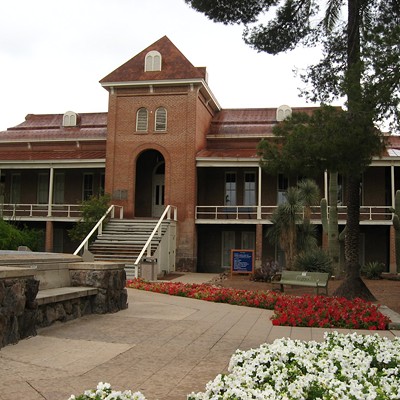The Tucson Police Department wants you to be its friend, but isn't necessarily looking to swap party stories with you.
It wants to be followed by you, too—but don't expect to be mentioned or retweeted.
And while TPD officials wouldn't mind you enjoying its lineup of online video clips, the intent is meant to be more educational than entertaining.
Such is the approach the Police Department has taken over the past six months, since it arrived in the world of social media, specifically on Facebook, Twitter and YouTube.
"We're not going to be ad-libbing a bunch from (crime) scenes on Twitter," said Sgt. Matt Ronstadt, a TPD spokesman. "There won't be a whole lot of entertaining commentary for the sake of entertaining."
Since summer, Ronstadt, along with police spokeswoman Sgt. Maria Hawke, have been adding tweets, status updates and video uplinks to their media and public-information responsibilities. It's part of a mandate from police Chief Roberto Villaseñor to increase the department's social-media presence as a way to get information out to sections of the population that don't regularly watch TV or read newspapers—and, in some cases, to get info to the public before the media even hear about it.
"Normally, it's the same information we're sending out to the media, but sometimes what goes on Facebook first is (something like) a road closure, because we're working a serious collision or something, and we're at the scene," Ronstadt said.
All TPD Facebook updates get copied to the department's Twitter account, which as of Dec. 14 had just a shade more than 3,000 followers. The Facebook page, which like Twitter is public and doesn't require approval to be "liked," has a little more than 2,800 likes.
The department's YouTube channel, active since late July, has more than 300 people who have signed up to be notified of any new videos uploaded to the site. And despite only displaying 13 videos—including a cheesy welcome message from Villaseñor—the clips have been viewed more than 43,000 times.
The most-popular videos are of crashes, noted Sgt. Tim Beam, supervisor for TPD's traffic safety camera program.
"You can't give away tickets to the ballet, but you can sell tickets to a car crash," joked Beam, whose office culls crash and near-miss highlights from footage at the city's eight red light cameras.
Beam said the videos aren't posted to shame anyone—he said any crash-related clip will be at least 90 days old, to avoid affecting any possible court action connected to it—but rather to educate viewers on just how dangerous running a red light can be.
"I think a lot of people don't understand the dynamics of what occurs in a crash," he said.
Beam said one video, which has yet to be posted, shows a woman who, while pre-occupied with a phone call, sped through an intersection a whopping 34 seconds after the green light ended. No other vehicles were in the area at the time.
"She just got really lucky," Beam said. "Those are the kind of things that kill people."
Ronstadt said he hopes to add surveillance videos and other relevant footage to YouTube.
In the meantime, his and Hawke's social-media focus has involved posting updates on the sorts of crimes and incidents that would be reported to local media: homicides, bank robberies, serious or fatal crashes, and missing-persons reports, as well as information on upcoming events involving TPD.
Like the updates that newspapers and TV and radio stations post to their websites, TPD's Facebook page allows comments on all posts, including those related to arrests and to people wanted in connection with crimes.
So far, Ronstadt said, the dialogue created by such commentary has remained relatively docile. But Ronstadt said he will cut off a thread "if the flavor of the conversation becomes inflammatory.
"We want to make sure the conversation is kept constructive," he said, noting a disclaimer on the page's info tab that TPD is "moderating this page to ensure that we maintain an environment where all visitors can feel safe."
Social media has also enabled TPD to create a forum for situations in which officials believe a local news outlet might have misreported, embellished or sensationalized a story in a way that made the department look bad.
Labeled "for the record," it's archived within the Facebook page's photo album. TPD has thrice called out the Arizona Daily Star for inaccuracies in editorials and articles related to police-staffing levels.
On Nov. 9 it lashed out at KGUN Channel 9 for a story it said "embarks on a reckless mission to create controversy" surrounding an incident in which a TPD officer's vehicle was stolen by an armed suspect.
"We had already commented on the reasons why there was no story there, essentially, and it was our opinion that the story was reported on, anyway, and was not reported in a fair and open manner," Ronstadt said.
Aside from such posts, Ronstadt said, TPD's social-media approach isn't intended to be a back-and-forth relationship with the public. The department doesn't accept online crime reports, nor is it expected that visitors might post legitimate, reliable tips via Facebook.
But Ronstadt has asked investigators in various departments to try to determine if any tips to 88-CRIME or other sources came as a result of seeing something online.
"So far, there's no certainty that we've had a tip that's led to an arrest specifically from Facebook," he said. "I'd like to be able to provide that feedback to someone who has maybe done that, who has posted (something), to say, 'Hey, thanks for the help.'"
TPD Online
The Tucson Police Department has taken to social media to spread information. Check out TPD's likes, tweets and videos on Facebook, Twitter, and YouTube.












